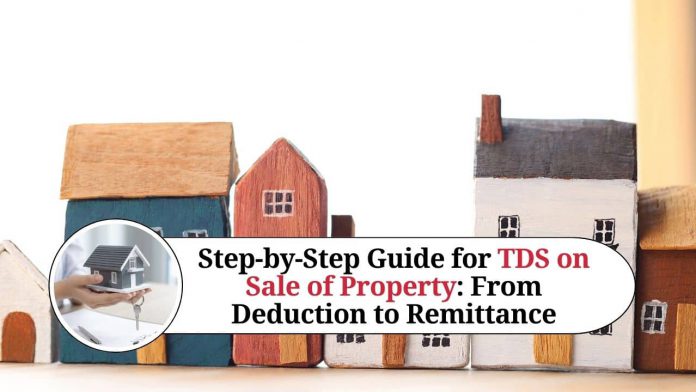Understanding TDS on Sale of Property
Selling a property is a significant financial transaction that involves various legal and tax-related considerations. One of the key tax-related considerations that sellers must be aware of is the deduction of TDS (Tax Deducted at Source) on the sale of property. TDS is a form of advance tax payment that is deducted by the buyer and remitted to the government. In this blog, we will provide an overview of TDS on the sale of property, including its applicability, rates, and procedures.
Applicability of TDS on Sale of Property
TDS on the sale of property is applicable when the sale consideration exceeds Rs. 50 lakhs. The TDS is deducted at the rate of 1% of the sale consideration, and the seller can claim credit for the TDS amount while filing their income tax return. It is important to note that TDS is only applicable on the capital gains arising from the sale of property and not on the entire sale consideration.
For the purpose of TDS, the sale consideration is the total amount paid or payable to the seller, including any advance or deposit that is part of the sale consideration. If the sale consideration is paid in installments, TDS is applicable on each installment as and when it becomes due.
Exemptions from TDS on Sale of Property
There are certain exemptions from TDS on the sale of property, as follows:
- If the sale consideration is less than Rs. 50 lakhs, TDS is not applicable.
- If the property is being sold by a non-resident Indian (NRI), TDS is deducted at the rate of 20% instead of 1%.
- If the seller is a government entity or a statutory corporation, TDS is not applicable.
- If the property is being acquired under the Right to Fair Compensation and Transparency in Land Acquisition, Rehabilitation, and Resettlement Act, 2013, TDS is not applicable.
Procedures for TDS on Sale of Property
The procedures for TDS on the sale of property are as follows:
- The buyer of the property is responsible for deducting TDS at the time of making the payment to the seller.
- The TDS is deducted at the rate of 1% of the sale consideration and is remitted to the government within 30 days from the end of the month in which the TDS is deducted.
- The buyer is required to obtain a Tax Deduction and Collection Account Number (TAN) and provide it to the seller.
- The buyer is also required to issue a TDS certificate to the seller in Form 16B within 15 days from the due date of remitting the TDS to the government.
- The seller can claim credit for the TDS amount while filing their income tax return.
Impact of TDS on Sale of Property
TDS on the sale of property has a significant impact on the cash flow of both the buyer and the seller. For the seller, the TDS deducted by the buyer reduces the amount of money received on the sale of property, while for the buyer, it increases the cash outflow. However, the TDS can be claimed as credit while filing the income tax return, which reduces the overall tax liability for the seller. Additionally, the TDS certificate issued by the buyer serves as proof of tax paid, which can be used by the seller to avoid any future tax-related disputes.
Penalties for Non-Compliance
Non-compliance with TDS provisions can result in penalties and interest charges. If the buyer fails to deduct TDS or remit it to the government within the prescribed time, they may be liable to pay a penalty of 1% per month or part thereof. Similarly, if the buyer fails to issue the TDS certificate to the seller within the prescribed time, they may be liable to pay a penalty of Rs. 100 per day for each day of delay.
Conclusion
TDS on the sale of property is an important tax consideration for both buyers and sellers. Buyers must ensure that they deduct TDS at the applicable rates and remit it to the government within the stipulated time, while sellers must keep a record of the TDS deducted and claim credit for the same while filing their income tax return. By understanding the procedures and rules related to TDS on the sale of property, buyers and sellers can avoid any unnecessary tax-related hassles and ensure a smooth transaction.
Read more useful content:
- How to Save Tax on Salary
- Guide to Understanding Direct Taxes in India
- Filing Income Tax Returns
- GST E-invoice
Frequently Asked Questions (FAQs)
Q1.) Is TDS applicable on the entire sale consideration or only on the capital gains?
TDS is only applicable on the capital gains arising from the sale of property and not on the entire sale consideration.
Q2.) What is the rate of TDS on the sale of property?
TDS on the sale of property is deducted at the rate of 1% of the sale consideration.
Q3.) Is TDS applicable if the sale consideration is less than Rs. 50 lakhs?
No, TDS is not applicable if the sale consideration is less than Rs. 50 lakhs.
Q4.) Who is responsible for deducting TDS on the sale of property?
The buyer of the property is responsible for deducting TDS on the sale of property.
Q5.) Can the seller claim credit for the TDS amount while filing their income tax return?
Yes, the seller can claim credit for the TDS amount while filing their income tax return.
Q6.) What is the due date for remitting the TDS to the government?
The TDS must be remitted to the government within 30 days from the end of the month in which the TDS is deducted.
Q7.) What is the penalty for non-compliance with TDS provisions?
Non-compliance with TDS provisions can result in penalties and interest charges. If the buyer fails to deduct TDS or remit it to the government within the prescribed time, they may be liable to pay a penalty of 1% per month or part thereof. Similarly, if the buyer fails to issue the TDS certificate to the seller within the prescribed time, they may be liable to pay a penalty of Rs. 100 per day for each day of delay.
Q8.) Are there any exemptions from TDS on the sale of property?
Yes, there are certain exemptions from TDS on the sale of property. For example, TDS is not applicable if the sale consideration is less than Rs. 50 lakhs, the property is being sold by a non-resident Indian (NRI), the seller is a government entity or a statutory corporation, or the property is being acquired under the Right to Fair Compensation and Transparency in Land Acquisition, Rehabilitation, and Resettlement Act, 2013.
Q9.) Can the TDS amount be adjusted against the capital gains tax liability of the seller?
Yes, the TDS amount deducted by the buyer can be adjusted against the capital gains tax liability of the seller while filing their income tax return.
Q10.) Do sellers need to submit any documents to the buyer for TDS purposes?
Yes, sellers need to submit their PAN card and other relevant documents to the buyer for TDS purposes.




















